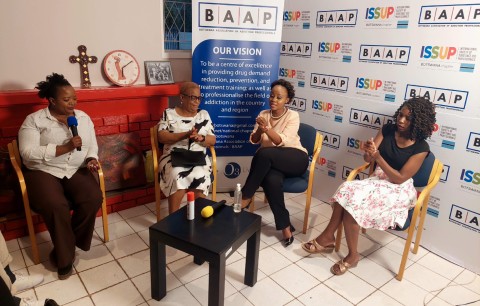As an effort to recognise Recovery Month this year ISSUP Botswana hosted a Panel Discussion on the 27th of September 2022. The panellists were a person in recovery, a family in recovery and an Addiction Professional working in recovery. The audience members included both people in recovery, addiction professionals and over 400 viewers on Facebook.
The panel discussion was held under the theme Recovery is Possible. The goal of the theme was to give viewers and listeners hope that amidst the addiction crisis that has plagued our nation, with adequate treatment people can rebuild their lives and embark on a journey of healing and transformation.
It goes without saying that people in recovery carry power and resilience. Odireleng Kasale, the panellist in recovery, demonstrated this by vulnerably sharing her recovery journey. She said that her early days of recovery were sometimes daunting because of the little resources available in her community, especially mutual aid groups. “There was one meeting, my sponsor was in South Africa but I was determined to make my recovery work and I used the literature and the tools, insights I gained from online meetings to strengthen and anchor my recovery.”
She went on to highlight that there is increasing evidence that inclusion of the valuable inputs and meaningful engagements of people in recovery can yield positive outcomes in co-creating and implementing policies, programs, and services in addiction treatment and recovery. “It was also very early on in my recovery that I decided I want to help those struggling with addiction. I took the initiative to register and go through the Universal Treatment Curriculum through the Ecolink Institute of Wellbeing and sit for my ICAP through the Global Centre for Credentialing and Certification. As much as my lived experience carries a wealth of knowledge, it also imperative to deliver evidence practices that ensure positive treatment outcomes.”
Addiction is a family disease. One person may use substances but the whole family is affected. Family dynamics are damaged and trust is eroded. Ms Ntoti Mosetlhe however highlighted that there is hope when family members equip themselves with knowledge and tools on how to safeguard their mental wellbeing of their loved ones in addiction. “What really happens with anyone living with a person struggling with a Substance Use Disorder is that they too become sick. They are affected psychologically by the constant worry about their loved one. Until I got the education and information I thought I could solve the problem. Being part of a family program helped me begin my recovery journey and accept that I have no control over my loved one.”
The discussion ignited a meaningful discussion on the ISSUP Facebook pages on the need of more visible and structured recovery community in Botswana. It was a very much needed conversation and a reminder that Recovery is Possible.
Odireleng Kasale

